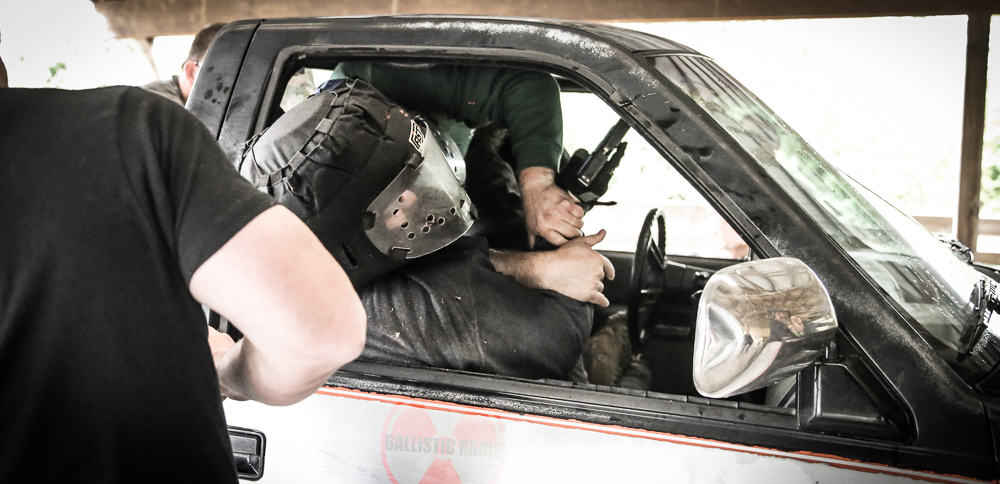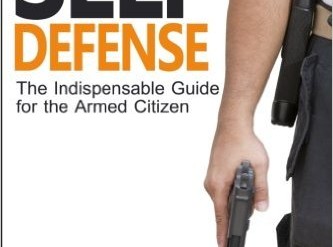Let me start off by making the really inflammatory statement that will either have you closing your browser windows now, or furiously scrolling down the page to the comments section to vent your ire at me. IN MOST INSTANCES YOU DON’T NEED TRAINING TO SUCCESSFULLY DEFEND YOURSELF WITH A GUN. See, I told you it was inflammatory.
Anyone who has spent any amount of time listening to my show, or reading my various posts across the internet is probably aware of the fact that I attend a lot of training classes. These classes have covered a lot of different topics, everything from tactical medicine, to two man structure clearing tactics. Some of these classes have been relatively easy for me, while others (ECQC) have been absolutely ego destroying. As I’ve said many times in the past, you really start to question some of the skills you’ve focused on the first time an opponent in a Force on Force setting disarms you, immobilizes you, and then begins to shoot you with your own gun. As I said earlier it’s absolutely ego destroying. I guess what I’m trying to say is, I’ve been very lucky and gotten to do a lot of very cool things due to the nature of my job. Does that mean I’m better prepared than the average person who carries a gun day in and day out though?

What has training done for me exactly? It’s allowed me to pressure test myself and my equipment with varying degrees of success. It’s also allowed me to practice making potentially life altering split second decisions under stress. At this point unless I’m having a particularly bad day I can even say I’m performing the physical mechanics of shooting on a relatively high level without having to think about it at all. I’ve learned how to recognize, avoid, and deescalate potential dangerous situations MUCH faster than I was able to 5 years ago. I’ve even pursued some basic medical training so I can be better prepared to deal with the aftermath of a defensive gun use, or the much more likely, car accident or other less tactical, trauma. Are any of those necessary for the common person to be able to successfully utilize a gun for self-defense? As I said earlier, not at all, as evidenced by the sheer number of people with zero training who fend off bad guys on a daily basis.
I’ve got a hypothesis however, that the higher the level of training you have received, the less likely you are to ever find yourself in a situation where you’ll need the gun. I’ve no real way to test it, but in discussing the concept with several very well known instructors I’ve yet to hear any compelling evidence to the contrary, and in fact most of them seem to agree with me. It is my deeply held belief that what training does for us, is make it much less likely that we’ll ever have a shooting in the first place. I’ve heard a plethora of answers when I ask industry people why training helps us avoid shootings: people become more aware of their surroundings, they dedicate themselves to avoidance after learning how bad a real fight can be, they appear more confident and are less likely to be selected as a victim, they make better decisions in general and are less confrontational etc…
I don’t know what the final answer is to the self-defense question. I really feel like I’m just now starting to understand the question in the first place so I’m in no position to present “the answer”. I will say this however. You don’t need hundreds of hours of training to survive most self-defense encounters. Untrained people prevail, with varying degrees of success, against bad guys all the time. Does that mean I’m advocating for people to seek less training? Of course it doesn’t. It also does not take into account statistical outliers, Sentinel Events, such as the one that hero concealed carry licensee Joseph Wilcox faced when he confronted two cop-killers at a Las Vegas Walmart. What it does mean however is we need to reexamine the value that we get from training, such as the untold number of potential incidents we avoid after we take the time to educate ourselves to the realities of self-defense and predator behavior.
Additionally we need to think about the type of training that we seek when we do choose to seek it. I love high round count shooting classes just as much as the next guy. I can tell you right now though once I had reached something approaching proficiency I had to acknowledge that I was going to shooting classes because I liked them, not because I was learning any vital self-defense skills. The classes where I was learning vital self-defense skills were almost uniformly low to no round count, with an emphasis on recognizing and solving problems. Often times these included Force on Force scenarios where there was another active participant opposing my will and taking immediate advantage of my mistakes. These classes were also uniformly, very humbling experiences. While no one likes to be shown their inadequacies, it is vital to learn where your weaknesses lay if you are going to attempt to improve at all.
So let me finish where I started. You don’t need training to successfully defend yourself with a gun in most circumstances. You do need training however if you want to begin to learn what it is exactly that you don’t know. You do need training to force your mind into making vital and potentially life altering decisions, under stress, in very short periods of time without relying on blind luck to get you through. You do need training to recognize some of the very subtle indicators that a predator is running you through their victim selection process. And you certainly need training to come any sort of close to understanding what a violent encounter is actually like if you’ve never found yourself in one.
So while I’ll stand behind the statement that in most instances you don’t need training to successfully defend yourself with a gun, I can’t think of a single event where it would hurt to know just a little bit more…



I agree Wholeheartedly!!!, by training more with my sidearms it has also peaked my interest in situational awareness, threat assessment etc etc etc, and I believe this will transcend in to avoiding or defusing conflict where none is to be taken. NOone can argue that they have “enough” training to meet every threat or situation perfectly, only effectively.
Your statement echos something I heard John Holschen say in a class he was instructing at Insights, that he is less likely to be involved in a shooting because the best thing to do in a shooting is to not be in one.
Well said.
“It is my deeply held belief that what training does for us, is make it much less likely that we’ll ever have a shooting in the first place.” You’re belief is 110% true
exceptional piece…
In other words, go get your ‘bo Bo’ by playing mountain goat. I agree that training with those who in the course of their lives have placed themselves in dangerous situations with the intent of getting out alive without firing a shot is some of the most valuable training any citizen can take.
Exceptionally well written article, with which I agree wholeheartedly.
Excellent article. Defense training should start with avoiding the situation in the first place, then move on to weapons.
Very brave article! Some would say Blashemy!
I do agree with you, but to add to your point, I believe it’s everything you learn about PRIOR to the actual pressing of the trigger that makes you more unlikely to ever need to fire.
The exact same concept was instilled in martial arts training. Amateurs get in street fights, and the well trained walk away before it ever happens.
Unfortunately, much of CCW/Firearms training does not illuminate this concept. FYI I am a former police officer, who went on to become an instructor and Team Leader on a Federal Special Response Team for the Dept of Energy.
The one thing I always noticed is how you can train a monkey to shoot a gun accurately, but you can’t always train a human to engage the brain. I’ve seen people go I to the stress state of Black simply being involved in Simmunitions. They weren’t even being shot at yet!
My favorite gun quote is, “Amateurs talk about hardware, but professionals talk about software.”
Please keep up the insightful writing, your on to something.
The statement may be true, but only AFTER you have learned and mastered the very basic technique of safe and proficient gun handling. I referring to what most people would consider the bare minimum understanding of the 4 rules, and being able (under ideal circumstances like a dry, bright warm day on the range) to hit all rounds from 1 whole magazine from the gun they want to use in at least the “C” scoring zone of an IPSC target at 7 yards. So in other words once you have learnt not to accidentally shoot yourself or a friend, and can hit what you’re aiming at then yes.
Excellent points. An issue very few in the training business will admit is that the training that is popular (intensive high speed live fire classes, mostly) is mainly popular because it’s fun, and gives people an opportunity to play with their toys (shoot their guns) — not because it teaches the skills they are most likely to use, which are less exciting things like reading human behavior and avoiding potentially bad situations. Most of us that teach force on force classes have a much harder time filling those courses, compared to live fire classes, even though the FoF training (particularly scenario based FoF where many scenarios are no-shoot) is much more useful. The hard truth is that the errors most armed citizens make, that land them in court or jail, are failures in non-shooting skills. Despite reasonable concerns that it’s necessary to have a fast enough draw and good enough accuracy, it’s really hard to find examples of cases where bad shooting and slow drawing are what resulted in a bad outcome for an armed citizen. And it’s really easy to find examples where bad tactics and questionable shoot/no-shoot decisions lead to terrible outcomes.
It’s the oldest truism of gun-handling; the best way to survive a gunfight is not to get into one.
And further to what you’ve written here is the downside that a *lot* of the “training” that has been sold into the um, “boom” market of the past several years, aside from the training itself being of questionable quality and value, is that it has encouraged quite of few of the wannabe ninjas and sheepdogs to do just the opposite; place themselves into a potentially contentious or dangerous location or scenario… situational awareness done backwards, on the theory that they are now equipped to stride purposefully and fearlessly into harm’s way, prepared and almost anxious to defend themselves or others from BG’s. We will certainly see some repercussions of that going forward; posts like your “heresy” here might help avoid some of it.
Spot on.
I’d add one more thing: when people learn to effectively use firearms for self defense, the near-unavoidable result is that they learn how to live safely with the gun. After all, a habit of safe and efficient gunhandling that’s sturdy enough to stand up to life threatening stress, is also sturdy enough to stand up to ordinary distractions in everyday life… which are far more common than violent criminal encounters.
John, I’ve heard you and others make this kind of statement before. While it is true that many people with virtually no training do successfully defend themselves using firearms – WHAT IS THEIR PERCENTAGE OF SUCCESS AS A GROUP?
From the data I’ve seen, it’s not all that high – certainly no higher than 50/50 ish (and prob a bit lower). This is based on a fair bit of data from an acquaintance of mine who’s been a detective in a major metropolitan area for some years and has looked at hundreds, of civilian defense incidents – having access to the case files, video footage, etc.
Contrast this with, say, the record of Tom Givens’ 64-ish-some-odd students who have been involved in “incidents”.
Those with a gun have had, so far, a 100% success rate. The few (3, I think) who lost chose not to carry a gun that day.
I say training makes a significant difference, and the fact that SOME people are successful with zero training doesn’t mean a person shouldn’t train to “die less often.” If someone is interested enough to have a gun for self defense, what if we told them that good training could improve their chance of survival 50% to 70% should they ever have to use it, vs. well it probably doesn’t matter since some people defend themselves successfully with no training. Sloppy thinking from my perspective.